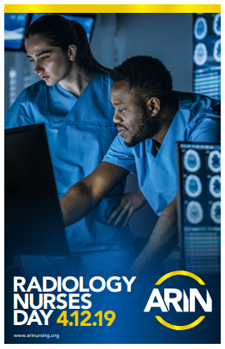
Celebrate Radiologic and Imaging Nurses Day
Radiologic and imaging nurses are a busy group of professionals right now. With so many people ill with the COVID-19 respiratory virus, radiology has been a key diagnostic tool for patients.
National Radiologic and Imaging Nurses Day, sponsored by the Association for Radiologic and Imaging Nursing, is celebrated this year on April 12. Many people worldwide are now familiar with how important this tool is in diagnosing everything from routine screening to illness. COVID-19 patients undergo a high number of imaging studies to diagnose the lung problems, such as fluid in the lungs from pneumonia, that are a frequent complication from this virus.
Radiologic and imaging nurses are there to help patients who are undergoing various tests using ultrasound, CT scans, MRI, PET scans, or fluoroscopy, for example. They might be with patients as they undergo cardiac procedures that require imaging for placement and direction such as for catheters or stents or they might be on a team for guided breast biopsies or to diagnose deep vein thrombosis.
Nurses in this specialty work with patients of all ages and they generally have quick interactions with them, rather than extended time. However, many radiologic and imaging nurses who remain in the same organization might find they build relationships with repeat patients. They might see the same people come in for annual screenings, or they may be an integral part of a patient team for someone managing or recovering from an illness.
Opportunities to build relationships are important in radiologic and imaging nursing. You might see a patient only one time, but your interaction with them will help them mitigate any anxiety about a procedure, celebrate good results or manage results that aren’t good. A steady, professional, and empathetic nurse makes any kind of imaging procedure easier for the patient—even if it doesn’t always seem that way.
Nurses in this specialty can also expect a career that includes constantly changing knowledge of the different machines used in radiology and imaging studies. You’ll need to be familiar with how the machines work and know about standard and safe practice. You’ll use this information in caring for your patients and also to help educate them about what is going to happen while they are under your care.
You’ll need to use your knowledge about the actual machines to then help inform your practice about how the machines are used in each procedure—whether it is a catheterization, a biopsy, or a scan of lungs or a liver for example. Each procedure varies based on the patients and any comorbidities they have. So critical thinking is an essential skill and one that will be used each day as a radiologic and imaging nurse.
If this area of nursing interests you, you’ll use all your different skills for assessing patients, managing their care, working with cutting-edge technology, being an essential team member, and understanding the various body systems impacted by any imaging work.


